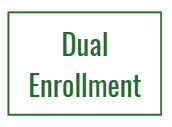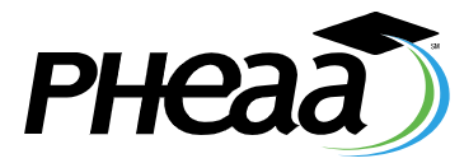Types of Financial Aid
FREE Money
Earned Money
Borrowed Money
Grant money is typically based on financial need and is money that you don’t pay back. This may come in the form of a Federal, State, or Institutional grant.
Scholarships and work-study let you earn money (through merit, performance, or work). Usually, you won’t need to repay these.
Loans are an investment, but they must be repaid (+ interest). ONLY BORROW WHAT YOU NEED!
Free Application For Federal Student Aid (FAFSA)
The first major step in the financial aid process is completing the FAFSA. It determines your eligibility for:
- Federal Aid Programs: Pell grants, campus-based aid, and direct student loans
- PA State Aid Programs: PA State grant, PA work-study, and other special programs
- School Aid Programs: need-based aid and scholarships
You can complete this form only, and the site usually goes live ve Oct. 1st! You should aim to complete the form soon after this live date. Also, note your school’s preferred deadline!
What is the FAFSA?
Colleges and career schools use the FAFSA to determine how much financial aid you are eligible to receive. It calculates how much you can get in grants and in federal loans. It also determines your eligibility for some need-based scholarships and work-study.
You must apply every year, with updated information
Who should complete the FAFSA form?
Any student who plans to file for financial aid programs must complete the FAFSA. This is the first step to your financial aid process. Students and their contributors (typically a parent) must complete their section of the form for it to be completed.
How do I complete the form?
- Create a StudentAid.gov Account
- The student and contributor – anyone who’s required to provide information on the FAFSA form – needs to create this account before they can access the form. If the student is filing as an independent, then they are the only one who needs to create an account.
- You will need to provide your name, date of birth, and Social Security Number. You will also need to input a valid email address and phone number (accounts cannot share emails or phone numbers).
- It will take them a couple of days to verify your account
- Gather Needed Documents
- Federal Tax Returns and Schedules (from two years before the academic year- ex., if academic year is 2026-2027, use 2024 tax information)
- Current bank statements
- Current business and farm records (if applicable)
- Records of any stocks, bonds, and other investments
- Records of child support received (if applicable)
- Start the FAFSA form
- Log in to StudentAid.gov
- The FAFSA form should guide you through your sections!
- List Schools (colleges/career schools)
- At the end of the form, the student must list their schools of interest.
- You can list up to 20 schools (you do not need to have applied or be accepted to the school to list them). If you are thinking about attending this school, list them.
- List in order of preference
- You may add or delete schools later on
- Sign and submit the FAFSA form
CSS Financial Aid Profile
Institutional Application
Some schools have their application, which must be completed in addition to the FAFSA. You must complete all required applications and return them to your school(s) promptly. Look at your school’s financial aid page to see what applications are needed.
PHEAA - Pennsylvania Higher Education Assistance Agency
PHEAA aims to provide affordable access to higher education for PA students and families. They also process the Pennsylvania State Grant (you must complete the FAFSA to receive a state grant).
They provide student financial aid services, PA-based loan programs, and countless free information sessions for students and families (both in-person and virtual).
Their website has information about student loans, funding opportunities, college planning, and so much more! Click on the logo to learn more.
Click on the logo to visit the website.
SCHOLARSHIPS
There are many types of scholarships, some you don’t even need to apply for! Most colleges offer merit-based scholarships. These scholarships may be awarded based on academic achievement or a combination of academics and a special talent, trait, or interest. Typically, applying for the college\ automatically opens you to their merit-based scholarships.
There are also scholarships geared towards particular groups of people. And some because of where you or your parent works (always ask your parents’ employer – you never know!) or because you come from a certain background (for instance, there are scholarships for military families).
Check out the scholarship and scholarship databases below. Speak to your guidance counselor; we have information about local scholarships that you can apply for!
College Prep Scholars Program
What is it?
- A head start at a top college
- Prepares students to apply for the National College Match
- Scholars are 7x more likely to receive the National College Match scholarship
- College prep, guidance, and resources to develop a strong college application
- Provides exclusive access to summer programs, admissions conferences, personalized resources, etc.
Eligibility
- High school juniors currently attending high school in the U.S. and U.S. citizens.
- Earning primarily A’s in the most challenging courses offered
- Demonstrating strong writing skills and intellectual curiosity, plus resilience, integrity, and motivation to succeed
- Typically from a household earning less than $65,000 annually, with minimal assets (for a household of four members)
National College Match
What is it?
- Offers qualified high school seniors full four-year scholarships (with no loans or parent contribution!) at QuestBridge college partners. The scholarship is valued at over $325,000. And seniors from low-income backgrounds can apply for early admission to the nation’s best colleges.
Eligibility
- High school seniors currently attending high school in the U.S. and planning to attend college the fall after graduation.
- Earning primarily A’s in the most challenging courses offered
- Demonstrating strong writing skills and intellectual curiosity, plus resiliency, integrity, and motivation to succeed
- Typically from a household earning less than $65,000 annually, with minimal assets (for a household of four members)















